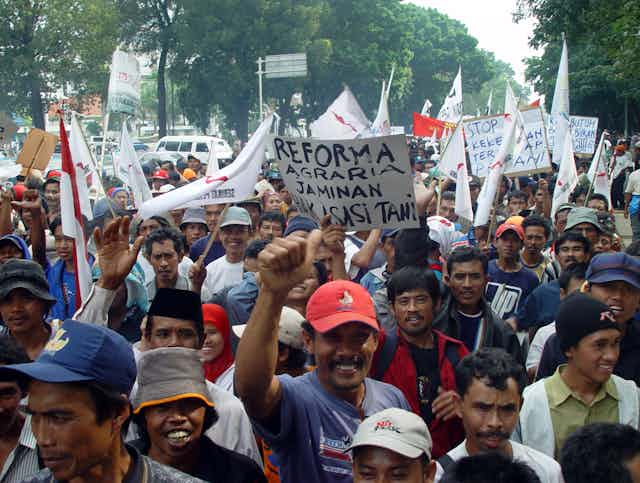Land conflicts are prevalent across Indonesia.
The latest data from the Agrarian Reform Consortium, an NGO that’s concerned about land conflicts, show the number of cases jumped almost 40% in 2017 to 659 from 472 cases in 2014. A third of land conflicts were found in plantation sectors.
Most of these conflicts are between local actors – communities and indigenous peoples – and corporations or government agencies over rights to control and manage land.
Many of these conflicts begin when, especially in the past, the government gives rights to companies to manage a large area of land without prior consent from local people who have been managing the land for generations.
Both the state and developers often argue that local people’s land claims are illegitimate and they don’t have the right to claim the land. This is usually because they lack formal evidence. But the local people who have been living in the area for generations think otherwise, triggering resistance and conflicts.
Read more: The human cost of palm oil development
Our research has identified two effective strategies local people can use to settle with their land conflicts issues.
These strategies involve advancing their claims on disputed lands based on their rights as citizens as well as indigenous people.
By demanding their rights as citizens and indigenous groups, community groups in Kampar district, Riau province, and in West Tanjung Jabung district, Jambi province, have been able to reclaim their rights from large pulpwood plantation companies.
This is how.
Getting justice
Since Indonesia became a new democracy in the late 1990s, the government has begun to recognise the rights of poor people in rural areas to manage their lands and forests.
This recognition has empowered poor people to seek justice when companies take over their land. Sometimes they win.
This is what happened with farmers from Senyerang Village in West Tanjung Jabung district of Jambi province. The community has lived in the area for centuries, growing rice, coconut and betel nut.
Since the early 2000s, the farmers had been in conflict with a large plantation company in the province.

The farmer group finally granted part of their demands to manage the land in 2013 as a result of their relentless campaigns demanding their rights over the land.
Based on earlier decision from the Ministry of Environment and Forestry, the company agreed to allow the Senyerang farmers to plant rubber trees in 1,001 hectares of land inside its concessions.
The company also agreed to share part of its profits with the community.
Justice for indigenous rights
Indigenous people in Indonesia can claim customary rights to local resources in their traditional or ancestral territories.
Local indigenous people often use this type of argument to reclaim land rights.
An indigenous group, the Datuk Pangeran Perkaso community (not a real name), in Kampar district of Riau province has adopted this approach during its conflict with another pulpwood plantation company.
The group has resisted the company’s plantation development since it started operating in the area around 1993. They argued that the firm had taken over about 4,500 hectares of their land.
In the end, they managed to reclaim some of their rights to their land. But it took a long time to get some of the things they demanded.
Kampar district administration issued a regulation that recognises the rights of indigenous groups to their lands in 1999.
But it took the community 16 years to finally see the company accept a written agreement on profit-sharing over 1,000 hectares within the company’s acacia plantation concession.
The group consisted of only 397 families. Therefore, the group decided to involve people originating from North Sumatra, Aceh and other parts of the province to support and join the struggle.

However, the move backfired as involving non-indigenous people weakened their basis claim as indigenous people.
Due to their lack of bargaining power, negotiations resulted in an agreement with much poorer outcomes compared to the case in Jambi above.
Better alliance
Collective actions by local communities and indigenous groups are crucial for their success in reclaiming their land rights. National and international support networks and campaigns are also a determinant factor, especially for companies with access to international markets.
However, if we compare the outcomes of the two approaches, reclaiming land rights using citizens’ rights is more effective than using indigenous rights because the former tends to be more inclusive.
Inclusivity is important for forming bigger coalitions to help local communities win their land conflicts against powerful companies.
In the Jambi case, the local people could form a union and mobilise 2,002 farmers from various ethnic backgrounds, including those migrating from other provinces in their movement.
This is not the case in Riau.
However, using indigenous rights to claim land ownership may be effective in cases involving homogeneous communities.
What’s next
The two land conflict cases in Jambi and Riau may have been “successfully” settled eventually.
However, both communities are still far from getting justice. They haven’t been able to get the rights to effectively manage and control their land because the disputed lands have remained part of the companies’ concessions and belong to the state.

A recent state-led agrarian reform program under President Joko “Jokowi” Widodo is expected to address such issues. The program includes land certification, land redistribution and social forestry initiatives.
However, its implementation has focused mostly on distributing land certification for people whose land ownership is clear. Redistribution of land to local communities is still very limited.
Agrarian reform has yet to address more fundamental issues of land conflicts stemming from the unequal distribution of land.
Unless the government reforms the law to protect the land rights of local and indigenous communities, many local people are prone to have their rights violated. The potential for future conflicts remains high.


